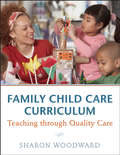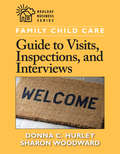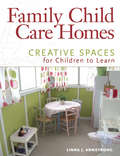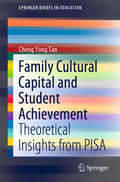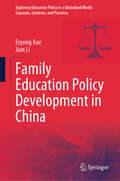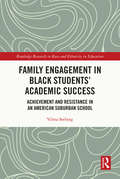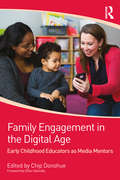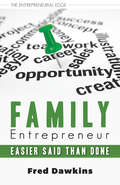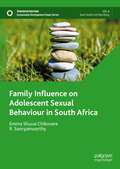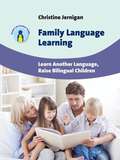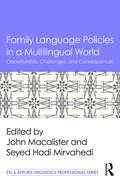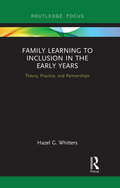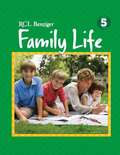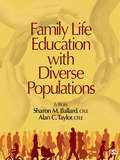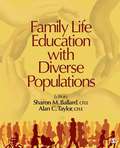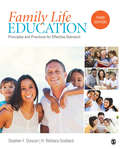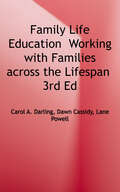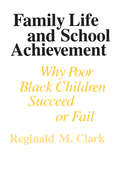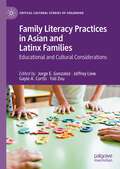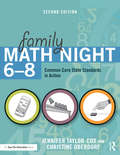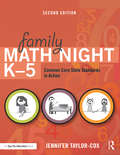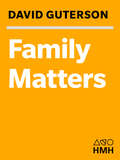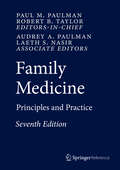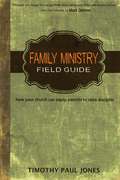- Table View
- List View
Family Child Care Curriculum
by Sharon Woodward200 fun and educational activities!A successful family child care (daycare) program promotes the healthy development of infants, toddlers, and preschool children in a caring, nurturing environment. Enrich your program and support children's early learning with best practices and activities designed specifically for family child care professionals.Family Child Care Curriculum includes a wealth of creative and inclusive activities that meet age-appropriate developmental objectives. Activities are organized both by age and developmental domain-physical and motor, cognitive, communication and language, and social and emotional-and complement the overall goals of a quality family child care program. These activities can be used with multiage groups of children and are easily implemented in your daily routine. This complete curriculum also includesFour developmental milestone charts describing typical development from birth through age fiveTips to provide quality learning environments and twenty-nine evaluation questions to improve your programSuggestions to create successful partnerships with familiesAdditional resources to help you develop a well-rounded program, including safety information and daily schedules
Family Child Care Guide to Visits, Inspections, and Interviews
by Donna C. Hurley Sharon WoodwardLearn the skills and best practices to make receiving visits more productive and worry-freeAs a family child care professional, you nurture and teach children during their most formative years. Being a family child care provider also means you must attend to families, licensors, food program representatives, coaches, and other people who visit your in-home business. This guide is filled with everything you need to successfully prepare for and host visits from people involved in the operation and regulation of your business.This book includes case studies featuring more than twenty common challenges that can occur during visits and skill-based solutions and successful strategies you can use to prepare for those situations. It also provides checklists and self-examination activities to help you welcome and connect with potential families, specialists, and inspectors in positive ways, as well as support, guidance, and techniques to enhance your program.Donna C. Hurley has been writing and delivering trainings for providers, parents, and home visitors or more than forty years.Sharon Woodward has more than twenty years of experience supporting family child care professionals.
Family Child Care Homes
by Linda J. ArmstrongCreate a warm and inviting place where children feel at home.Discover the many ways your home can provide comfortable places where children love to learn and love to be. Filled with no- and low-cost ideas, this book demonstrates many unique and practical possibilities for your home's indoor and outdoor spaces. Chapters are packed with colorful photographs and provide examples and tips for designing learning zones, selecting items, organizing materials, and more. Checklists, resources, and questions are included to help you evaluate your setting, implement changes, and create a place that feels like a second home to the children in your care.
Family Cultural Capital and Student Achievement: Theoretical Insights from PISA (SpringerBriefs in Education)
by Cheng Yong TanThis book focuses on the relationship between cultural capital and student achievement. It fills the gap in the literature on large-scale quantitative studies of the effects of cultural capital. In particular, the review of empirical evidence presented, especially that from studies analyzing large-scale, international data from the Programme for International Student Assessment (PISA), makes a substantial contribution to the literature. This review addresses the knowledge gap on reviews investigating the effects of different forms of cultural capital on student achievement as compared to the more established evidence base in the related field of socioeconomic status.
Family Education Policy Development in China (Exploring Education Policy in a Globalized World: Concepts, Contexts, and Practices)
by Jian Li Eryong XueThis book provides a comprehensive overview of family education policy development in China. Each chapter draws upon existing literature, reviews the policy text and implementation data, identifies the challenges of and problems in the policy implementation process, and proposes corresponding countermeasures and solutions. It examines a wide range of education policies in China, including the management policy of family education organization, family education resource allocation policy, family education guidance service policy, the educational policy on the parent-school cooperation, school support-based family education policy, community support-based family education policy, family education monitoring and evaluation policy, and family education responsibility sharing policy.
Family Engagement in Black Students’ Academic Success: Achievement and Resistance in an American Suburban School (Routledge Research in Race and Ethnicity in Education)
by Vilma SeebergThis timely volume presents powerful stories told by Black families and students who have successfully negotiated a racially fraught, affluent, and diverse suburban school district in America, to illustrate how they have strategically contested sanctioned racist practices and forged a path for students to achieve a high-quality education. Drawing on rich qualitative data collected through interviews and interactions with parents and kin, students, community activists, and educators, Family Engagement in Black Students’ Academic Success chronicles how pride in Black American family history and values, students’ personal capabilities, and their often collective, proactive challenges to systemic and personal racism shape students’ academic engagement. Familial and collective cultural wealth of the Black community emerges as a central driver in students’ successful achievement. Finally, the text puts forward key recommendations to demonstrate how incorporating the knowledge and voices of Black families in school decision making, remaining critically conscious of race and racial history in everyday actions and longer term policy, and pursuing collective strategies for social justice in education, will help eliminate current opportunity gaps, and will counteract the master narrative of underachievement ever-present in America. This volume will be of interest to students, scholars, and academics with an interest in matters of social justice, equity, and equality of opportunity in education for Black Americans. In addition, the text offers key insights for school authorities in building effective working relationships with Black American families to support the high achievement of Black students in K-12 education.
Family Engagement in the Digital Age: Early Childhood Educators as Media Mentors
by Chip DonohueFamily Engagement in the Digital Age: Early Childhood Educators as Media Mentors explores how technology can empower and engage parents, caregivers and families, and the emerging role of media mentors who guide young children and their families in the 21st century. This thought-provoking guide to innovative approaches to family engagement includes Spotlight on Engagement case studies, success stories, best practices, helpful hints for media mentors, and "learn more" resources woven into each chapter to connect the dots between child development, early learning, developmentally appropriate practice, family engagement, media mentorship and digital age technology. In addition, the book is driven by a set of best practices for teaching with technology in early childhood education that are based on the National Association for the Education of Young Children (NAEYC) and Fred Rogers Center joint position statement on Technology and Interactive Media. Please visit the Companion Website at http://teccenter.erikson.edu/family-engagement-in-the-digital-age
Family Entrepreneur: Easier Said Than Done
by Fred DawkinsA course in family-business entrepreneurship, taught through a narrative about four frustrated people taking a seminar that changes their lives. Limited time offer. In the second book in the Entrepreneurial Edge series, frustrated individuals, immersed in family businesses, enroll in a two-week course on entrepreneurship that will change their lives. For ten years Mary has been an office manager at her brother’s business only to see her younger brother join the company and receive shares while she gets none. Plagued by doubts about her ability to change the culture in the family business or succeed outside it, Mary signs up for a seminar series on family entrepreneurship. A crusty mentor named Sam conducts the seminars in a class that includes three others: a son considering taking over a family business, the owner of a successful company involving her two daughters, and a man with a stormy working relationship with his sister. The narrative brings us right into the class as Sam cleverly leads all of us to decisions about our future. Anyone interested in entrepreneurship, starting a business, or just managing their career will benefit from the shared experiences of this compelling story. Watch for Ageless Entrepreneur, arriving May 2015.
Family Influence on Adolescent Sexual Behaviour in South Africa (Sustainable Development Goals Series)
by R. Sooryamoorthy Emma Shuvai ChikovoreThis book explores the connection between family structure and circumstances, parental engagement, and adolescent sexual behavior. Given that South Africa contains the highest portion of the global HIV epidemic within a single country, a comprehensive, book-length investigation into—sometimes risky—adolescent sexual behaviour is necessary. Drawing from the longitudinal Cape Area Panel Study (CAPS) of more than 4,000 adolescents between the ages of fourteen and twenty-two, as well as qualitative interviews and focus group discussions with parents and adolescents, this study pioneers empirical investigation of adolescent sexual behavior within the intricate framework of family dynamics in South Africa.
Family Language Learning
by Christine JerniganFamily Language Learning is a practical guide designed to support, advise and encourage any parents who are hoping to raise their children bilingually. It is unique in that it focuses on parents who are not native speakers of a foreign language. It gives parents the tools they need to cultivate and nurture their own language skills while giving their children an opportunity to learn another language. The book combines cutting-edge research on language exposure with honest and often humorous stories from personal interviews with families speaking a foreign language at home. By dispelling long-held myths about how language is learned, it provides hope to parents who want to give their children bilingual childhoods, but feel they don't know where to start with learning foreign languages.
Family Language Policies in a Multilingual World: Opportunities, Challenges, and Consequences (ESL & Applied Linguistics Professional Series)
by John Macalister Seyed Hadi MirvahediThrough case studies from around the world, this book illustrates the opportunities and challenges facing families negotiating the issues of language maintenance and language learning in the home. Every family living in a bi/multilingual environment faces the question of what language(s) to speak with their children and must make a decision, consciously or otherwise, about these issues. Exploring links between language policy in the home and wider society in a range of diverse settings, the contributors utilize various research tools, including interviews, questionnaires, observations, and archival document analysis, to explore linguistic ideologies and practices of family members in the home, illuminating how these are shaped by macro-level societal processes.
Family Learning to Inclusion in the Early Years: Theory, Practice, and Partnerships
by Hazel G. WhittersUsing theory and practice to explore partnerships between professionals and families, Family Learning to Inclusion in the Early Years adds to current expertise through deeper insight into the complexities of inclusion within a specific context of family learning. The book presents inclusive practice which reflects the individuality of each child. Application of a therapeutic approach to promote, or to minimise, behaviour through self-regulation is demonstrated to the reader by illustrative examples. Hazel G. Whitters emphasises the value of supporting every child at the very beginning of a lifelong learning journey by activating the vocational skills of the early years’ workforce. Beginning with a discussion of the concept of family in the 21st century, descriptive scenarios help readers to link theory to the reality of daily practice in a clear and useful way. The book presents a generational cycle of development through a theoretical and practical perspective, and explains how practice can contribute to closing the implementation gap within a context of family learning and inclusion in the early years. It encourages exchange of knowledge and understanding on issues, prompting readers’ reflection, re-configuration, discussion, dissent, argument, or agreement. An essential read for any in the field of inclusive lifelong learning, this book will be of interest to academics, post-graduate students, and researchers in the field of early years’ education, as well as those working within services.
Family Life 5
by David ThomasStudent Book highlights the virtues and skills needed for family life. Links parents and teachers with a two-page Family Time Feature. Lessons are presented in three parts: Engage, Teach, Apply. Student book includes unit reviews, glossary and a section of Catholic prayers and practices.
Family Life Education With Diverse Populations
by Sharon M. Ballard Dr Alan C. TaylorFamily and human service professionals in a variety of disciplines engage in family life education, which is designed to strengthen, enrich, and empower families. This includes many content areas such as couple and parent-child relationships, balancing work and family, parenting, financial literacy, interpersonal communication, and sexuality. The authors bridge the gap between research and practice by examining and presenting key strategies for working with diverse populations including those based on race and ethnicity, family structure, geographic location, and context. By defining eleven diverse groups and presenting their strengths and unique cultural characteristics, the authors present an evidence-based practice approach with each chapter, prescribing the best practices for working with these diverse groups in regard to general FLE needs, educator characteristics, ethical considerations, marketing and recruitment, modes of learning, and environmental considerations. This book is essential for students who are preparing to work with families, as well as professionals engaging in FLE activities with diverse populations.
Family Life Education with Diverse Populations
by Sharon M. Ballard Alan C. TaylorFamily Life Education with Diverse Populations is a T2 for courses in Family Life Education. Family Studies and Social Work students often go through the additional certification of becoming Family Life Educators (FLEs). As a family life educator, the student will help educate families in and outside the traditional classroom environment on how to strengthen relationships in the home and foster positive individual, couple and family development. Such education comprises many topics, including marriage education, parenting skills, anger management, to strategies in adjusting to divorce. This book takes the content delivered in courses on FLE a step further by examining and presenting key strategies for working with diverse populations. Diverse is defined broadly in terms of race and ethnicity, but also by setting, such as military families, rural families, families with loved ones in prison, and more. The book is unique in defining the group and presenting their strengths, and then prescribing treatments and strategies for working with each group. In addition, the book takes an evidence based practice approach and demonstrates proven strategies in working with the populations listed above. Sharon M. Ballard, Ph. D. , CFLE, CFCS: is an Associate Professor in the Department of Child Development and Family Relations at East Carolina University. Alan C. Taylor, Ph. D. CFLE: is an Assistant Professor in the Department of Child Development and Family Relations at East Carolina University.
Family Life Education: Principles and Practices for Effective Outreach
by Stephen (Steve) Duncan H. (Harold) GoddardA practical how-to guide to developing, implementing, evaluating, and sustaining effective family life education programs. Drawing on the best scholarship and their own years of professional experience, the authors of this thoroughly updated Third Edition begin by discussing the foundations of family life education and encourage readers to develop their own outreach philosophies. The book then helps readers learn principles and methods for reaching out to the public and how to form and use community collaborations and use principles of social marketing to promote programs.
Family Life Education: Principles and Practices for Effective Outreach
by Stephen (Steve) Duncan H. (Harold) GoddardA practical how-to guide to developing, implementing, evaluating, and sustaining effective family life education programs. Drawing on the best scholarship and their own years of professional experience, the authors of this thoroughly updated Third Edition begin by discussing the foundations of family life education and encourage readers to develop their own outreach philosophies. The book then helps readers learn principles and methods for reaching out to the public and how to form and use community collaborations and use principles of social marketing to promote programs.
Family Life Education: Working with Families Across the Lifespan
by Carol A. Darling Dawn CassidyThis text is the first ever developed as an undergraduate level textbook for Family Life Education. It introduces the theory, principles, and skills necessary to prepare, present, and evaluate family life education programs and workshops. The text is based on the National Council of Family Relations guidelines for undergraduate education, and integrates theory and applications appropriate for established areas of education such as high schools, educational extension services, and community and youth centers. The scope includes sex education, marriage and family relations, parenting, and youth services.
Family Life and School Achievement: Why Poor Black Children Succeed or Fail
by Reginald M. ClarkWorking mothers, broken homes, poverty, racial or ethnic background, poorly educated parents--these are the usual reasons given for the academic problems of poor urban children. Reginald M. Clark contends, however, that such structural characteristics of families neither predict nor explain the wide variation in academic achievement among children. He emphasizes instead the total family life, stating that the most important indicators of academic potential are embedded in family culture. To support his contentions, Clark offers ten intimate portraits of Black families in Chicago. Visiting the homes of poor one- and two-parent families of high and low achievers, Clark made detailed observations on the quality of home life, noting how family habits and interactions affect school success and what characteristics of family life provide children with "school survival skills," a complex of behaviors, attitudes, and knowledge that are the essential elements in academic success. Clark's conclusions lead to exciting implications for educational policy. If school achievement is not dependent on family structure or income, parents can learn to inculcate school survival skills in their children. Clark offers specific suggestions and strategies for use by teachers, parents, school administrators, and social service policy makers, but his work will also find an audience in urban anthropology, family studies, and Black studies.
Family Literacy Practices in Asian and Latinx Families: Educational and Cultural Considerations (Critical Cultural Studies of Childhood)
by Jeffrey Liew Gayle A. Curtis Yali Zou Jorge E. GonzalezThis book focuses on the literacy beliefs and practices of parents and children from Asian and Latinx heritage backgrounds. In the US, children from Asian and Latinx immigrant backgrounds represent the largest population of dual language learners in schools. While existing research has paid significant attention to the roles of parenting and the home literacy environment on children's literacy development, relatively little attention has been allocated to immigrant families. Chapters aim to meet the need in the field to understand the roles of culture and immigrant experiences on children's literacy learning and development, including immigrant families' home environments and parents' involvement in literacy-related activities in both English and the parents' native language. As Hispanic/Latinx and Asian American populations grow in the US, this book answers an urgent call for school systems and child and family professionals to be aware of issues in this area and how to address them in culturally responsive ways.
Family Math Night 6-8: Common Core State Standards in Action
by Jennifer Taylor-Cox Christine OberdorfHost Family Math Nights at your middle school—starting today! Family Math Nights are a great way for teachers to get parents involved in their children’s education and to promote math learning outside of the classroom. In this practical book, you’ll find step-by-step guidelines and activities to help you bring Family Math Nights to life. The enhanced second edition is aligned with the Common Core State Standards for Mathematical Content and Practice with new activities to help students explain their answers and write about math. It also comes with ready-to-use handouts that you can distribute during your event. With the resources in this book, you’ll have everything you need to help students learn essential math concepts—including ratios and proportional relationships, the number system, expressions and equations, geometry, and statistics and probability—in a fun and supportive environment. Special Features: The book is organized by math content, so you can quickly find activities that meet your needs. Each activity is easy to implement and includes a page of instructions educators can use to prepare the station, as well as a page for families that explains the activity and can be photocopied and displayed at the station. All of the family activities can be photocopied or downloaded from our website, www.routledge.com/9781138200999, so that you can distribute them during your event.
Family Math Night K-5: Common Core State Standards in Action
by Jennifer Taylor-CoxHost family math nights at your elementary school—starting today! Family math nights are a great way for teachers to get parents involved their children’s education and to promote math learning outside of the classroom. In this practical book, you’ll find step-by-step guidelines and activities to help you bring family math nights to life. The enhanced second edition is aligned with the Common Core State Standards for Mathematical Content and Practice with new activities to help students explain their answers and write about math. It also comes with ready-to-use handouts that you can distribute during your event. With the resources in this book, you’ll have everything you need to help students learn essential math concepts—including counting and cardinality; operations and algebraic thinking; numbers and operations in base ten; number and operations – fractions; measurement and data; and geometry—in a fun and supportive environment. Special Features: The book is organized by math content and grade band, so you can quickly find activities that meet your needs. Each activity is easy to implement and includes a page of instructions educators can use to prepare the station, as well as a page for families that explains the activity and can be photocopied and displayed at the station. All of the family activities can be photocopied or downloaded from our website, www.routledge.com/9781138915541, so that you can distribute them during your event.
Family Matters: Why Homeschooling Makes Sense
by David GutersonAn honest, perceptive discussion of children, education, and our common life as a nation by the bestselling author of Snow Falling on Cedars. A high school English teacher, Guterson and his wife educate their own children at home. "A literate primer for anyone who wants to know more about alternatives to the schools" (Kirkus Reviews). Index.
Family Medicine
by Robert B. Taylor Paul M. Paulman Audrey A. Paulman Laeth S. NasirMedical students will excel in their family practice clerkships with the practical information in this pocket-sized resource! It examines key clinical skills #65533; patients presenting with a sign, symptom, or abnormal lab value #65533; and patients presenting with a known condition-each in its own section for easy reference. Useful illustrations, key points, and clinical cases throughout the text put essential guidance at the reader's fingertips. Describes the special characteristics of a family medicine practice clerkship and provides guidance on working in an office-based community setting. Offers concise guidance on essential diagnostic tests and office procedures. Examines a broad range of physical and mental health issues for male and female patients across the lifespan. Addresses the questions students are most likely to be asked by attending physicians during their clerkship. Helps readers prepare for board exams with USMLE-style questions, answers, and rationales.
Family Ministry Field Guide: How Your Church Can Equip Parents to Make Disciples
by Timothy Paul JonesScripture calls parents to train and nurture their children's faith. How can churches best equip families to disciple their children? <p><p> Family ministry expert Dr. Timothy Paul Jones gives church leaders a practical plan to equip parents to be the primary faith trainers in their children's lives, moving beyond mere programming into genuine spiritual transformation. <p> This resource is for leaders in the trenches--those who: <p> see parents disengaging from their children's spiritual development, <p> see too many students leave for college and drop out of church, or <p> are frustrated with programmed ministries that fail to produce results. <p> Based on solid research, this field guide unpacks how real-life churches can narrow the gap between present reality and the biblical ideal of faith-nurturing families.
